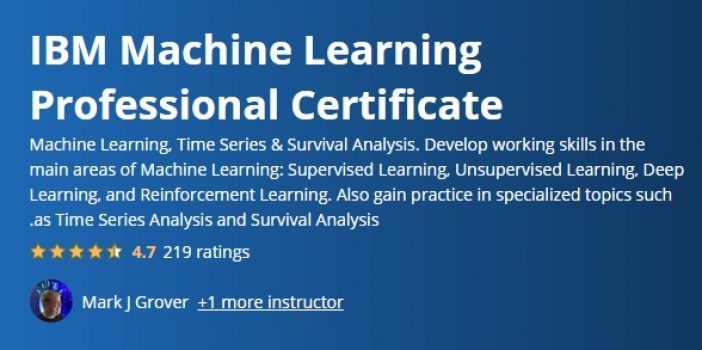This program consists of 6 courses providing you with solid theoretical understanding and considerable practice of the main algorithms, uses, and best practices related to Machine Learning . You will follow along and code your own projects using some of the most relevant open source frameworks and libraries.
Although it is recommended that you have some background in Python programming, statistics, and linear algebra, this intermediate series is suitable for anyone who has some computer skills, interest in leveraging data, and a passion for self-learning. We start small, provide a solid theoretical background and code-along labs and demos, and build up to more complex topics.
In addition to earning a Professional Certificate from Coursera, you will also receive a digital Badge from IBM recognizing your proficiency in Machine Learning.
What you will learn in this specialization course
- Exploratory Data Analysis for Machine Learning : This first course in the IBM Machine Learning Professional Certificate introduces you to Machine Learning and the content of the professional certificate. In this course you will realize the importance of good, quality data. You will learn common techniques to retrieve your data, clean it, apply feature engineering, and have it ready for preliminary analysis and hypothesis testing.
-
Supervised Learning: Regression : This course introduces you to one of the main types of modelling families of supervised Machine Learning: Regression. You will learn how to train regression models to predict continuous outcomes and how to use error metrics to compare across different models. This course also walks you through best practices, including train and test splits, and regularization techniques.
-
Supervised Learning: Classification : This course introduces you to one of the main types of modeling families of supervised Machine Learning: Classification. You will learn how to train predictive models to classify categorical outcomes and how to use error metrics to compare across different models. The hands-on section of this course focuses on using best practices for classification, including train and test splits, and handling data sets with unbalanced classes.
-
Unsupervised Learning : This course introduces you to one of the main types of Machine Learning: Unsupervised Learning. You will learn how to find insights from data sets that do not have a target or labeled variable. You will learn several clustering and dimension reduction algorithms for unsupervised learning as well as how to select the algorithm that best suits your data. The hands-on section of this course focuses on using best practices for unsupervised learning.
-
Deep Learning and Reinforcement Learning : This course introduces you to two of the most sought-after disciplines in Machine Learning: Deep Learning and Reinforcement Learning. Deep Learning is a subset of Machine Learning that has applications in both Supervised and Unsupervised Learning, and is frequently used to power most of the AI applications that we use on a daily basis. First you will learn about the theory behind Neural Networks, which are the basis of Deep Learning, as well as several modern architectures of Deep Learning. Once you have developed a few Deep Learning models, the course will focus on Reinforcement Learning, a type of Machine Learning that has caught up more attention recently. Although currently Reinforcement Learning has only a few practical applications, it is a promising area of research in AI that might become relevant in the near future.
-
Specialized Models: Time Series and Survival Analysis : This course introduces you to additional topics in Machine Learning that complement essential tasks, including forecasting and analyzing censored data. You will learn how to find analyze data with a time component and censored data that needs outcome inference. You will learn a few techniques for Time Series Analysis and Survival Analysis. The hands-on section of this course focuses on using best practices and verifying assumptions derived from Statistical Learning.
After completing each course in specialization and complete the hands-on project, you’ll earn a Certificate.
Course Rating : 4.7
Instructors :Mark J Grover,Miguel Maldonado
Offered By : IBM
Can I download IBM Machine Learning Professional Certificate course?
You can download videos for offline viewing in the Android/iOS app. When course instructors enable the downloading feature for lectures of the course, then it can be downloaded for offline viewing on a desktop.Can I get a certificate after completing the course?
Yes, upon successful completion of the course, learners will get the course e-Certification from the course provider. The IBM Machine Learning Professional Certificate course certification is a proof that you completed and passed the course. You can download it, attach it to your resume, share it through social media.Are there any other coupons available for this course?
You can check out for more Udemy coupons @ www.coursecouponclub.comDisclosure: This post may contain affiliate links and we may get small commission if you make a purchase. Read more about Affiliate disclosure here.



